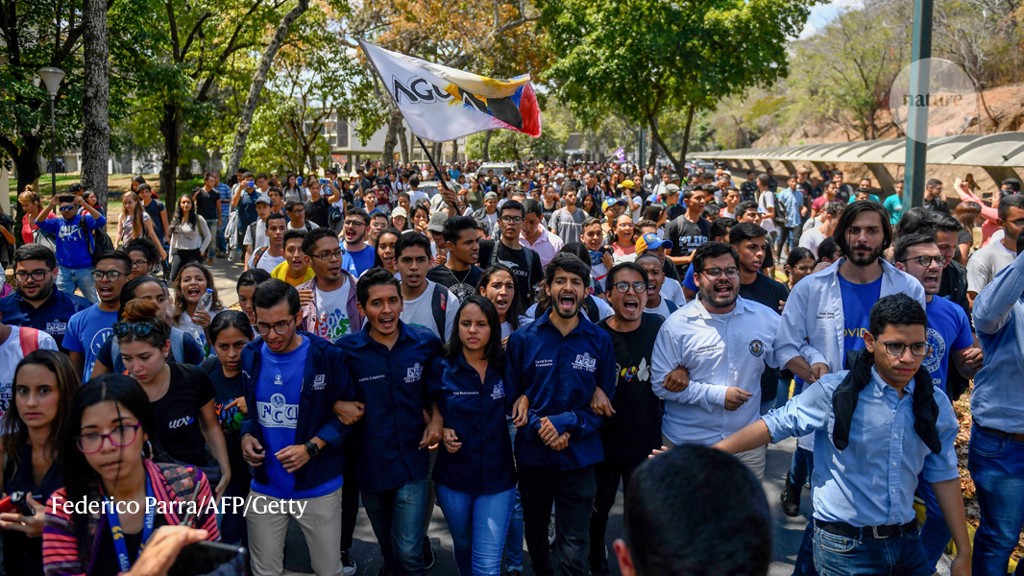Being a PhD student abroad during a time of major upheaval in my home country, Venezuela, has been a frustrating experience in many ways, and it took a toll on me physically and mentally. I had lived and worked in the United States after graduating from university in 2014, and was due to start my PhD at the University of Arizona in Tucson in August 2016. That summer, having not been home for three years, I was looking forward to spending a few months between work and grad school at home with my family.
But in May 2016, when I planned to go home, the refusal of Venezuela’s government to issue visas for the US Embassy’s personnel came to a head and the United States and Venezuela nearly severed diplomatic relations. As a result, the US Embassy in Caracas stopped processing certain types of visa and delayed services for student visas. As a student, I needed to transfer from an undergraduate F-1 visa to a graduate one. Getting my student visa application processed became infeasible, because the waiting times for scheduling a student-visa appointment, which were posted on the embassy website, changed daily. Given the rising tensions, the waiting times quickly increased drastically, going from days to weeks to months. And, because the embassy was not technically closed, I couldn’t simply go to another US Embassy in a different country. Thus, going home would have been a gamble that would have put my PhD in jeopardy.
So much for going home
Rather than risk my status as an incoming PhD student, I cancelled my travel plans and crashed with some friends in the United States. During that time, my F-1 student visa expired, but my new I-20 allowed me to stay legally, as long as I didn’t leave the country.
In May the following year, I was scheduled to take my PhD qualifier exams, while Venezuela was engulfed in a series of major protests. For more than 50 consecutive days, people took to the streets in protest against the government of the incumbent president, Nicolás Maduro.
As a Venezuelan graduate student in the United States, people often ask me how I’m able to compartmentalize my studies from the political upheaval in my home country. The truth is that I can’t. As humans, that’s not how we work.
The week of my qualifiers I was glued to my phone, television and social media for updates, barely able to concentrate. Rather than trying hopelessly to study, a group of other Venezuelans and I reached out and gave an interview to Azteca Tucson 14 — a local television station — to share our stories. Seeing the reporter and cameraman tear up and cry during the interview was one of the most beautiful displays of empathy I’ve seen. It reminded us that there are people out there who still care about Venezuela. It gave us hope, and it felt right. In hindsight, maybe it was wrong — I failed one of my qualifier exams.
For the next six months, I shut myself in the library. Failing my degree and returning to a country that had been destroyed by an economic and humanitarian crisis was not an option I could contemplate.
On 18 January 2018, I received notice that I had passed my exams. To this day, I think the hardest part about it was not being able to convey what it meant to me. It wasn’t just an opportunity to stay at school — it was a lifeline.
It’s now 2020, and this year I’m due to finish my PhD. In the past four years, the political crisis in Venezuela has created many personal and professional obstacles. To be honest, because of this, I haven’t really had a chance to enjoy my PhD. The reality is that being a Venezuelan immigrant these days makes you feel almost stateless. Many Venezuelans abroad (including me) hold expired passports with minimal or no options to renew them. And because of my visa situation, I haven’t been home to Venezuela since 2013.
A life in limbo
My mother is Moroccan, and the country has always been a second home to me. Every other summer for as long as I can remember, we would spend a few weeks visiting my mother’s family. With each trip, I took time to learn more about my North African roots. This year, despite not having been able to visit since 2012, I decided to apply to become a Moroccan citizen. Not out of love or romanticism, but out of necessity — I need a valid passport to apply for jobs.
In my seven years of visa limbo, I have managed to see my parents or my brother about once a year — a luxury I greatly treasure. However, now that I’m so close to graduating, all I can think about is going home and seeing everyone again. It’s been too long. It’s been years of frustrations, close calls, and a sense of detachment and isolation.
This led me to seek help.
For a few years now, I’ve attended counselling at the University of Arizona, which has been the best choice I’ve made in recent memory. Opening up to my advisers and my colleagues in the lab about the mental-health issues I’ve faced was the second best.
My lab regularly hires international researchers, so is well equipped to help me with any visa-related and political challenges. Opening up to other lab members about my mental health has made it easier for my colleagues to be supportive, and has provided me with a support system I desperately needed. It’s made me not have to constantly pretend to be doing OK. The more they learnt about my situation, the more they’ve helped me to find opportunities to continue succeeding at every step of the way. More importantly, opening up helped me to grow as a person.
I found that being an international student added additional layers to problems already outside my control. However, by taking agency and prioritizing my mental health I’m feeling better. Every time I leave a counselling session I feel hope, and that’s how we should all feel in grad school.

